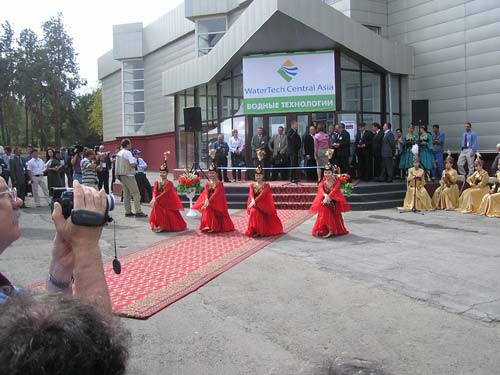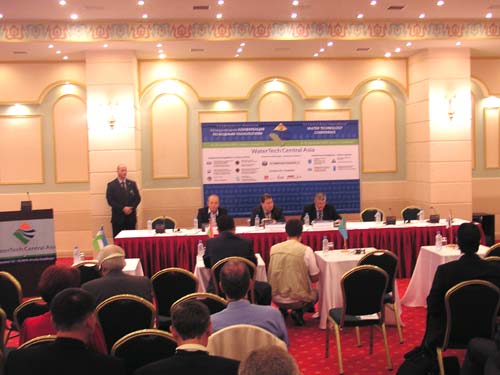XIII WORLD WATER CONGRESS
The World Water Congress is organized every three years by the International Water Resources Association (IWRA) by its Governing Board’s resolution in different countries. At the previous IWRA Congress in Delhi it was decided to organize XIII Congress in Montpellier, France, 1-5 September, 2008.
The Congress was held at the Congress Center in the Rhone Languedoc province and it gathered more than 700 participants from 54 countries.
Mr. Sophilut, Chairman of the Languedoc Roussillon Region, has presented a greeting speech of Mr. Bernard Kouchner, who is the Minister of the International Affairs of France. Ms. Cecilia Tortajada, President of IWRA, emphasized the main challenges for global water wellbeing in her opening address: globalization, climate change, population growth, economic growth, urbanization, increase of ecological disaster and policy management. Moreover, she noted the increase in electricity prices, change of diet in the line of increasing meat consumption, development of bio-energy production. In the report it was noted that even the world’s leading countries can not cope with degradation of water resources. An example is the Gulf of Mexico, where USA discharges waste via delta of Colorado River and where dead zone with the oxygen deficit is extended 3 times during 20 years from 1900 up to 6000 square miles.
The problems concerning sustainable management of complex water systems, funding of water development, overcoming the water deficit and effects of climate change, IWRM, development scenarios of various regions in the world, and transboundary water resources were considered at the congress sessions.
The special session was devoted to the problem of future water development and environmental security in Central Asia. The delegation of Uzbekistan headed by Mr. Alikhanov, the chairman of the State Committee for Nature Conservation, including Dr. Sh.R. Khamraev, Deputy Minister of Agriculture and Water Resources, Mr. Kh. Khamidov, Director of the Personnel and Educational Organizations Department at the same ministry, and also representatives of SANIIRI and of UzHydromet actively participated at the special session.
Professor V.A. Dukhovny on behalf of the IWRA Board was co-chairman at this session. At the end of the session, recommendations were adopted.
The delegation of Uzbekistan strenuously propagandized the position of the republic and personally of the President I.A. Karimov stated by him during the 48th and 50th sessions of the UN General Assembly, and also in the Almaty, Nukus and Tashkent declarations on a need for comprehensive cooperation and partnership in using the transboundary waters and overcoming environmental crisis in the region.
Sh.R. Khamraev in his report stressed the role of Uzbekistan, which signed two international Conventions on water resources (of 1992 and of 1997) and demonstrated the consequences that arose because of breach of the international water law using as an example the situation in the Syrdarya River Basin in 2008, when natural water deficit was aggravated by the activity of the Kyrgyz hydropower men, who didn't follow the agreed river regime in winter and summer.
In addition, reports on behalf of the Central Asian countries were presented at other meetings. Particularly, report of E. Roschenko, V.I. Sokolov and Prof. V.A. Dukhovny “GIS for Sustainable Water Development in Central Asia” was presented by Prof. V.A. Dukhovny, where a large work on rehabilitation of Amudarya and Syrdarya deltas and also desertification control of the Aral Sea bed attracted great interest of the participants.
Dr. V.I. Sokolov has reported about experiences of Kyrgyzstan, Tajikistan, and Uzbekistan in implementation of IWRM in the Fergana Valley, triggering the broad discussion of the first results of such activity.
The report “The current problems of water-energy resources in Tajikistan and Central Asia” was presented by Prof. I. Normatov.
Some information about water economy development in Afghanistan was given in the report of K. Wegerich.
The session "Transboundary groundwaters" , where representatives of Uzbekistan took part, must serve as serious warning indicating to a need to draw attention to this kind of international waters because some countries already have faced problems of quality deterioration, excessive water withdrawal and decreasing water supply.
The General Assembly appointed Brazil as the host of the next Congress.
THE FIRST CENTRAL ASIAN INTERNATIONAL EXHIBITION AND CONFERENCE “WATER AND WATER TECHNOLOGIES”
WATERTECH CENTRAL ASIA 2008
The painful situation with water supply in Central Asia is known all over the world. Most tragically this situation is illustrated by the destroyed ships on the sandbank far from a coastal line of that what was called before as the Aral Sea. It is obvious that preservation and maintenance of qualitative water supply became the critical strategic task, with which countries of Central Asia and, in particular, Kazakhstan today have met.
The First Central Asian International Exhibition and Conference devoted to water and to water technologies - WaterTech Central Asia 2008 - were organized aiming to solve the urgent problems and to adopt the needed solutions on future water supply in Central Asia. Sponsors of events are the exhibition companies Kenes International (Israel) and Iteca (Kazakhstan) with assistance of the Interstate Coordination Water Commission, Committee for Water Resources of the Ministry of Agriculture of the Republic of Kazakhstan, and SIC ICWC.
Exhibition and Conference were held in Almaty, Kazakhstan in September 16-18, 2008 at the exhibition building “Atakent-Expo”.
40 companies from Germany, Israel, India, Italy, Kazakhstan, Netherlands, Poland, Russia, France and Czech Republic took part at the exhibition.

Mr. A. Esimov, Mayor of Almaty city, in opening the exhibition noted an urgency of the exhibition "Water and Water Technologies" in the megalopolis being a large business centre of the country, where the plenty of the enterprises, bulk of people, and municipal and rural economy are concentrated in the suburban zone.
"Today the water resources problem is one of the most important issues all over the world. From year to year the water deficit is increasing and we have to treat water resources with care and to search new technologies for water economy. It is very important that various countries here can exchange experiences on advanced technologies in this sphere. We welcome all participants, sponsors of exhibition, and distinguished guests and wish you the pleasant staying in our town and successes in implementing of project", - Mr. Akhmedjan Esimov said.
Anatoly Ryabtsev, Chairman of the Committee for Water Resources of the Ministry of Agriculture, Republic of Kazakhstan said: "The potable water deficit in Kazakhstan is a result of its geographical location and requires water conservation, new technologies, and cooperation with neighboring countries. It is needed to study the existing positive experience of the problem solution by other states".
More than 100 experts from Central Asian countries and Israel took part at the conference.
Anatoly Ryabtsev, Chairman of the Committee for Water Resources and Professor Uri Shani, representative of the Ministry of Infrastructure of the State of Israel on the water resources issues, took part at the Opening Ceremony.

The conference was organized as a number of plenary meetings on the themes:
- “The impact of climate change on the global ecology and water resources”
- “Integrated water resources management”
- “Water reuse”
- “Water technologies and financial aspects”
- “Water-saving technologies, water-measuring and irrigation”
- “Land reclamation technologies for construction, reconstruction and operation of irrigation systems”
RESOLUTION OF THE INTERNATIONAL CONFERENCE WATERTECH CENTRAL ASIA 2008

Participants of the International Conference on water technologies "WaterTech Central Asia 2008", which was organized by the Committee for Water Resources of the Kazakhstan’s Ministry of Agriculture together with the Ministry of Infrastructure of Israel, noted with great satisfaction a very fruitful process of exchange of the modern approaches and technologies between the Central Asian countries and Israel.
The world is on the threshold of the all-round water deficit due to population growth, climate change and globalization. Central Asia experiences the increasing natural and anthropogenic droughts, desertification, as well as more frequent extreme phenomena within hydrological and climatic cycles. In this situation only the strengthening of cooperation between countries towards water saving and conservation can help the region to survive. Israel is recognized fairly as a leader of water supply in the world; therefore the regional water sector has to be widely informed about Israel’s experience because it is very fruitful.
The large-scale use of waste water as well as of salinity water after treatment and demineralization is particularly impressive. The advanced waste treatment industry allows ensuring the majority of water supply in Israel.
One of the main policy directions for Central Asian region to survive in the situation of water resources deficit is the adoption of IWRM at all levels of water hierarchy. Experience of its implementation in Central Asia and the project "IWRM Fergana" visually confirms the possibility to reduce water withdrawals and to improve water and land use productivities at the same time.
Involvement of public in waterworks management gives new impulse not only to management and to planning by community but also to direct control, modernization and financial support of management. It is time to apply these economic principles at the international water relations level in order that any actions in the basin could be assessed in terms of both benefits and damages to environment and society.
A prerequisite for prosperous IWRM implementation is the government support both legislative and managerial. Especially it concerns the financing of water saving technologies by government, progress in the juridical and legal frameworks, and the crediting of new kinds of water agencies. More attention must be paid to exploitation of all kinds of waters both surface and groundwater. The IWRM structure must include social mobilization, establishing of extension services for farmers and WUAs, equipping of all farms with water meters, revision of water consumption rates, measures on the efficient planning and implementation.
Kazakhstan is a leader in implementation of IWRM not only in terms of technical and institutional aspects but also legal aspects. Nowadays and in the future the regional water situation requires that policy and programs on water survival be comprehensive as to both technical and institutional aspects.
On the way to regional survival the possibility to use waste drainage waters, salinity of which is 3-10 g/l, is of great importance. Such unconventional water resources in the region are measured by tens cubic kilometers. Unfortunately, until now the effective treatment technologies for such waters have not been achieved. The Israeli experience allows hoping that collaboration between scientists from Central Asia and Israel can bring solution of this problem if costs of such water use is acceptable for users.
|